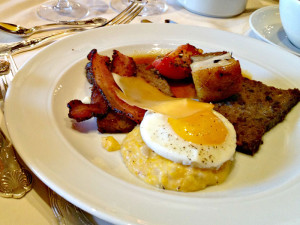Chester County played strong role in growth of regional favorite
By Cathy Branciaroli, Food Correspondent, The Times

Although long a favorite in southeast Pennsylvania — and with strong Chester County roots — scrapple is becoming an artisan food as well, as evidenced by this Antelope and Goose Scrapple with Sunny Side Egg and Grits.
Since last Sunday was National Scrapple Day, and with Southeastern Pennsylvania being the epicenter of scrapple-making, it’s time to take a look at this regional specialty.
The roots of scrapple-making go back more than 200 years and stem from frugal Amish farmers who married German cooking traditions with New World ingredients. Some people claim that scrapple is the first pork food to have originated in America. Traditional scrapple is a humble dish, originating in rural areas where farmers made imaginative use of their butchering scraps. And yes, it’s been affectionately said that the makings include everything but the squeal from the pig.
While the Amish may get credit for inventing scrapple, one of the premier early producers came from right here in Chester County. The Strode family of Strode’s Mill crossroads just south of West Chester was highly regarded throughout the region for producing the finest quality sausage and scrapple in the late 18th century. Marshall and his brother Francis Strode were the founders of the family sausage business with their initials and the date of “1875” carved into a stone on the core of the family’s old slaughterhouse which stands to this day.
It was Marshall’s son, Amos, who was responsible for making Strode’s Pork Products a Philadelphia tradition. In 1893, Amos took the business to the newly organized Reading Terminal Market in Philadelphia, and opened one of the original stalls. The Strodes built their reputation on the quality of their product — slaughtering only hogs raised on the farm, choosing only the younger and leaner stock, unlike what was typical of the industry at the time. Until the business was sold in 1983, the Strodes’ pork products were considered among the most famous agricultural offerings of Chester County.
But what exactly is scrapple, you ask? It is traditionally a loaf made with the leftover bits of the butchering. The pork scraps are chopped and boiled, combined with spice mixes and flour or cornmeal, and the entire mix is poured into loaf pans to chill and set. Once chilled, slices are cut and pan-fried or deep-fried.
Today, artisan scrapple makers such as Dean Carlson of Wyebrook Farms near Honey Brook use mostly pork shoulder so there is not much need to think about what the butchering “bits” include as in the past. To get your head around it, think of scrapple as a sort of fried polenta infused with a heavy does of pork character.
And these days, scrapple can be found on the menu everywhere from luxury hotels and popular gastropubs to greasy spoon diners and every local breakfast joint in between. Local chefs are getting creative with how they’re preparing it and what they’re putting in it.
At the MidAtlantic Food and Wine Festival held earlier this year, upscale chefs took up the challenge of reimagining scrapple using rabbit, goose, antelope and chorizo among other high-end ingredients. The chefs said that knowing how much the local community love their scrapple inspired them to create the imaginative concoctions, which were served paired with equally inventive egg dishes.
For instance, the antelope-goose scrapple was made with orange, sage and thyme for seasoning, and a sunny side egg atop a portion of grits. The chorizo version was served with a Mexican mole made with chocolate and black pepper, so that diners experienced a hot, yet sweet taste, and was paired with truffle quiche.
No matter what your scrapple preference, there’s something out there for you. If you would like to support local scrapple brands, try Habbersett Strapple, made in Media, Pennsylvania. Or try Dean Carlson’s artisanal scrapple, which can be purchased at the farm market. Call to be sure they are open at 610-942-7481.
Cathy Branciaroli also writes about her adventures in the kitchen on her blog Delaware Girl Eats






